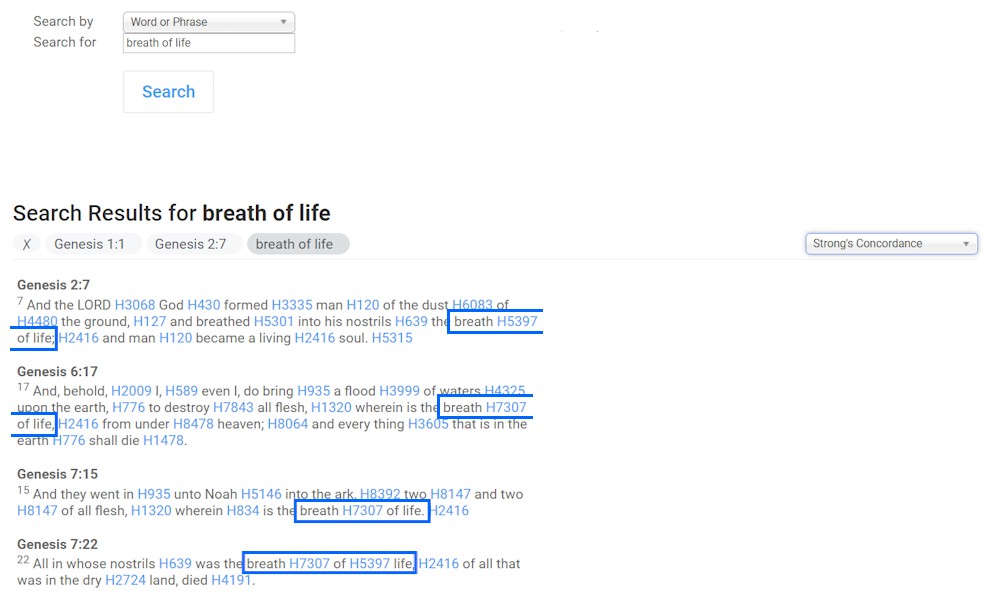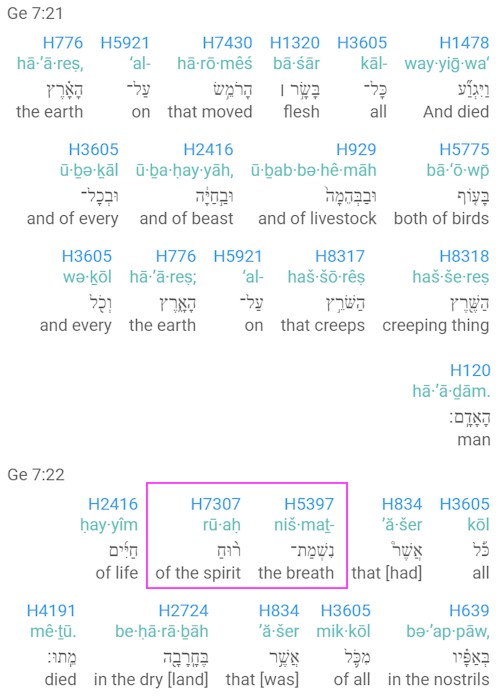Contents
The word spirit in the Bible is sometimes mistranslated and often misinterpreted. It’s time for scriptural enlightenment.

What does spirit in the Bible refer to? How does spirit in the Bible relate to neshama? “Study to show yourself approved to God, a workman that needs not to be ashamed, rightly dividing the word of truth” (2 Timothy 2:15).
(Mind-Body Problem Solved, Chapter 21 – Table of Contents)
So far, we have focused on neshama and established the following biblical facts.
- In Genesis 2:7 neshama is translated breath of life.
- Neshama comes from God (Job 32:8).
- God gave a part of His own neshama to humans (Job 32:8).
- Humans alone (not animals) possess neshama (Joshua 11:14 ).
- Job 32:8 reveals the neshama confers inspiration which gives understanding.
- The Explanation equates neshama with consciousness which automatically confers five qualities on all humans: purpose, function, socialization, rulership, and reasoning.
This divine essence is the distinguishing mark of humans. From the example of Nebuchadnezzar, we saw that without neshama, he lost all five of the above capacities; he was reduced to the state of an animal.
Notice that as an animal Nebuchadnezzar could still fulfill animal needs like foraging for food which is their main, not to say sole occupation along with sleeping and mating. Some animals also take care of their young for a limited period of time. Considering they do NOT have neshama, we shall see what animals DO possess that confers on them all the variety of behaviors in their hunting, mating, migration, and other activities. But when Nebuchadnezzar regained his reason (Daniel 4:34-36), it was accompanied by the retrieval of all five qualities.
The rest of this book, Mind-Body Problem Solved, focuses on spirit, in all of its types, and strengths. There are many more than you realize. This spirit in the Bible relates to animals, humans, spirit beings, and God. Spirit poses some of the most difficult theological problems. Materialists, who don’t believe in spirit, explain the Universe in purely material ways. For believers, there’s spirit and Spirit, with few knowing their relationship. Furthermore, in the Bible and especially religion, in its holy state, as the Holy Spirit, many believe it is a Person, a member of the Trinity while others reject this teaching. There is much to discuss.
Breath of life
We will start with a look at Biblical Hebrew and translations to show just how delicate this subject is. At UnlockBibleMeaning.com search for breath of life. There are only four verses. Switch to Strong’s Concordance and check the Strong’s number following the word breath.
Genesis 6:17 And, behold, I, even I, do bring a flood of waters upon the earth, to destroy all flesh, wherein is the breath (H7307) of life, from under heaven; and every thing that is in the earth shall die.
Genesis 7:15 And they went in unto Noah into the ark, two and two of all flesh, wherein is the breath (H7307) of life.
Genesis 7:22 All in whose nostrils was the breath (H7307 of H5397) life, of all that was in the dry land, died.
Here’s the confirmation in the King James Version and Strong’s Concordance. You can also look at each verse in the Interlinear to verify the Hebrew word.

Translations are helpful, but not always dependable. This is a prime example. The identical term in English (breath of life) comes from two unrelated Hebrew words: ruach (H7307) and neshama (H5397). Considering the fact these four phrases are within five chapters one has to wonder what the translators are thinking. We’ve spent eight chapters examining Gen. 2:7, H5397, and neshama, so we’re clear on that.
The three other verses have H7307, ruach. Many know ruach is Biblical Hebrew for spirit in the Bible.
רוּחַ rûwach roo’-akh; from H7306 (רוּחַ); wind; by resemblance breath, i.e. a sensible (or even violent) exhalation; figuratively, life, anger, unsubstantiality; by extension, a region of the sky; by resemblance spirit, but only of a rational being (including its expression and functions):
KJV – air, anger, blast, breath, ⨯ cool, courage, mind, ⨯ quarter, ⨯ side, spirit(-ual), tempest, ⨯ vain, (whirl-) wind(-y).
H7306
רוּחַ rûwach roo’-akh; a primitive root; properly, to blow, i.e. breathe; only (literally) to smell or (by implication, perceive (figuratively, to anticipate, enjoy):
KJV – accept, smell, ⨯ touch, make of quick understanding.
Ruach appears about 380 times in Biblical Hebrew of which about 235 are translated as spirit in the Bible, 100 with wind, and 30 with breath. Wind and breath are often used figuratively to mean spirit; this fits Step 2 to master Biblical Hebrew. Spirit in the Bible will be our focus and, believe me, there is much to study and discover. Simply by reading the above translations and the Strong annotations we can see its similarity to neshama with reference to immaterial and understanding. Similitude yes, identical, in no way.
Spirit in the Bible
We know humans possess ruach, spirit in the Bible, so I always wondered why Genesis doesn’t talk about ruach associated with neshama and nefesh (soul) and humans in Genesis 2:7 at Creation. Let me offer two points.
- When God created the first human, ruach was already present in the animals! This is clear from Genesis 7:15, “they (the animals) went in unto Noah into the ark, two and two of all flesh, wherein is the breath (H7307) of life.” Animals, including birds, fish, and the creeping things were created on Days 5 and 6, PRIOR to humans.
- Since ruach was already present in the living animal kingdom, and why it is solely mentioned in Gen. 2:7. Humans alone possess it, animals did not receive it and do not possess it as the episode in Joshua 11:14 aptly demonstrated.
In chapter 13, I showed you the Interlinear image for Genesis 7:22 with both words neshama and ruach, side by side and remarked, “you have to ask yourself why the KJV translators left out one of these two words (spirit). I will explain this, but not now,” Well, now that we’re broaching spirit in the Bible, it’s time for an answer.
For neshama, the KJV translators rendered breath, soul, and spirit for their translations. These same translations are used for other Biblical Hebrew words, which we will see below; this adds to the confusion of comprehension of what this first human, representing all humans, is.
20 Fifteen cubits upward did the waters prevail; and the mountains were covered.
21 And all flesh died that moved upon the earth, both of fowl, and of cattle, and of beast, and of every creeping thing that creep upon the earth, and every man:
22 All in whose nostrils was the breath (H5397) of life, of all that was in the dry land, died.
Here’s an image of verses 21-22 from the Interlinear Bible revealing a huge problem the KJV translators missed and didn’t know what to do. You can NOT see this in English.

Genesis 7.21-22 Notice the two Biblical Hebrew words nishmat ruach (breath of the spirit). You don’t see this in most English translations.
In Genesis 7:21-22, notice the two Biblical Hebrew words nishmat (neshama – the breath) and ruach (of the spirit). You don’t see this in most English translations as I explained in Chapter 13. There I also pointed out why this passage refers to humans.
Here, we want to emphasize the presence of this couple neshama, and ruach associated with humans. A better rendering of the Biblical Hebrew in Genesis 7:22 is.
“and every man, all in whose nostrils was the breath (H5397 – neshama) of the spirit (H7307 – ruach) of life.”
Quite a difference. Humans (every man, in the above verse) absolutely do possess both neshama and ruach, spirit in the Bible. Genesis 2:7, the Creation of the first human makes no mention of ruach, but it is 100% sure God infused this spirit with the neshama. Spirit is not mentioned there because it was already present in the animals and God wanted to draw our attention to the distinctive mark of humans, neshama. But the biblical fact is that neshama and ruach are inseparable. We shall see more verses to this effect.
Let’s do another exercise; transpose this Biblical Hebrew phrase into 21st-century scientific jargon. “And every man, all in whose nostrils was the breath (H5397 – neshama) of the spirit (H7307 – ruach) of life.”
We’ve already established the significance of neshama as consciousness. And the KJV translators rendered ruach (H7307 above), among other words with mind. So, in contemporary terms, Genesis 7:22 reads like this.
“And every human, all in whose nostrils was consciousness with the mind of life.”
Two separate, but complementary elements, neshama, and ruach, consciousness, and mind. The Explanation will elaborate on exactly what the mind is in relation to consciousness, and what it allows humans to accomplish. And remember, animals possess this ruach as well, so we shall see what exactly it equips them to perform as well.
I have no intention of trying to explain the motivations of the 17th century King James Version translators with regard to the absence of the word ruach in Genesis 7:22. We run into the same problem with the breath of life, translated from both neshama and ruach. And we are going to run into the mistranslations of nefesh-soul as well. All I will say is these unfortunate renderings have left us with a trail of confusion, false interpretation, and worse, false doctrine. This controversy and misunderstanding of the term ruach-spirit in the Bible is the reason The Explanation must venture into the Biblical Hebrew to solve the mind-body problem.
Understanding the companionship of neshama and ruach, consciousness and mind is a good start.
Dig Deeper into The Explanation
Online Study Courses to Uncover the Mystery of Adam and Eve’s Nakedness… with no fuss. Free video mini-course revealing the God-intended meaning of Scripture via Biblical Hebrew. It’s so easy, it’ll blow you away. Join now and add new motivation to your Bible study.
Join The Explanation Newsletter to stay informed of updates. and future events. No obligations, total privacy, unsubscribe anytime, if you want.
The Explanation series of seven books. Free to read online or purchase these valuable commentaries on Genesis 1-3 from your favorite book outlet. E-book and paperback formats are available. Use this link to see the details of each book and buy from your favorite store.

Since you read all the way to here… you liked it. Please use the Social Network links just below to share this information from The Explanation, Spirit in the Bible is Very Controversial and Misunderstood



Let’s Connect!